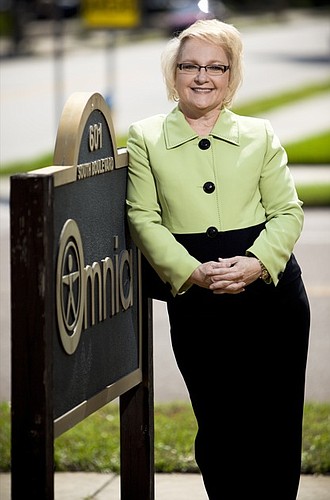- November 26, 2024
-
-
Loading

Loading

Valerie Harwell is still fairly new in her post as president and CEO of The Omnia Group, a Tampa-based firm that offers behavioral assessment and consulting services. Yet she has been familiar with the company for practically as long as it has been around.
“I was one of their first clients,” Harwell says, recalling her early career days in the mid-1980s with Davis Bros. Insurance, which later became Davis Baldwin Insurance.
She says the Omnia assessments were a huge help in making correct hiring decisions and were also instrumental years later when she ran the Florida region of Wachovia Insurance Services, which Davis Baldwin became a part of in 2000.
As changes continued within the larger company after Wachovia was acquired last year by Wells Fargo & Co., Harwell decided she need to make a change of her own. She had enough money put away to live on throughout this year when a bit of what she terms as divine intervention took place.
An acquaintance happened to mention to her this past spring that Heather Caswell, chairwoman and co-founder of Omnia, was looking for someone to take over CEO duties after the company experienced a substantial revenue decline last year. Besides having administrative experience, Harwell is qualified to administer the Myers Briggs Personality Profile, which likely made her the best candidate.
“Of course, her Omnia profile indicated she'd be perfect for the job,” Caswell stated in announcing Harwell's hiring May 26. “Her track record of achieving success through hiring and retaining the best people is exactly the message we want to convey to our employees and clients alike.”
Omnia was founded in 1985 and jointly managed by John and Heather Caswell. John Caswell died in October 2008 and running the company became too much for Heather Caswell to keep up on her own. She credits Harwell with having business acumen, keen insight into people and a passion for behavioral assessments.
A longtime student of human behavior, Harwell says she thought about becoming a psychologist before ultimately earning a bachelor's degree in business administration from Florida Metropolitan University. She is a big believer in using behavioral assessment tools, such as the Myers Briggs profile, to sort out the best employee prospects.
“It's about getting the right people in the right seats on the bus,” she says, relaying a sentiment she has used often in demonstrating how great employees will achieve likewise results. She points out that during her five years in charge of Wachovia Insurance, she nearly doubled its personnel to 200 while expanding its offices from two to seven, along with growing sales by 240% and margin by almost 500%.
She expects to be able to achieve similar results with Omnia, which has clients worldwide in a broad range of industries.
“I feel like we have the opportunity to build a Super Bowl team, but to go back every year and win,” says Harwell, an ardent football fan. “A-players want to be with other A-players. It always challenges them to do better.”
Having the right personnel doesn't necessarily mean looking for the best-qualified person for a particular position, but determining how well that employee will fit within a company's culture, Harwell emphasizes. Resumes don't reflect that ability, which is why she says behavioral assessments are so important, not just with new hires but internal promotions.
Because clients don't have as much time anymore to sort through the high volume of applications coming in for most job openings, she says Omnia offers to take care of that chore for its clients. She adds that the bottom-line expenses related to hiring and turnover justifies the cost of Omnia's profiles.
Current Omnia clients may realize this importance all too well. One such client related a testimonial in which his company hired someone despite assessment results advising against doing so.
“He's still here, but as you pointed out, he's great with relationships but won't push as much as we'd like him to,” the client wrote on Omnia's Web site. “We should've heeded your advice.”
Harwell, 49, says she already feels she is a good fit with Omnia, noting that she favors “circular management” over triangular organizational charts. She also points out that the company has already grown by 27% over the past year, attracting both small businesses and major corporations as clients.
Those new clients, as well as existing renewals, aren't as much an indication of how she is doing as an apparent emergence from the recession. “We think we're a pretty good indicator that the economy is improving,” she says.